Upholding the BRICS spirit of openness, inclusiveness, and win-win cooperation, and safeguarding national interests and people's well-being through digital prosecution
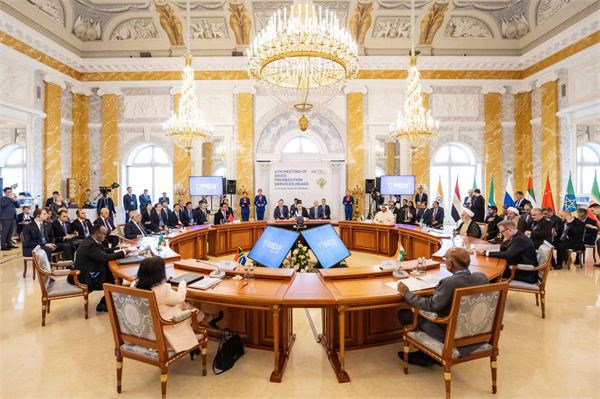
The 6th Meeting of the Heads of Prosecution Services of the BRICS Countries is held in St. Petersburg, Russia, on June 19.
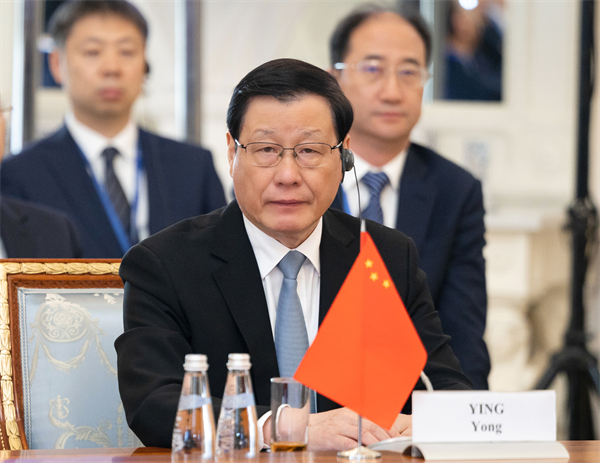
Ying Yong, Chief Grand Prosecutor and Prosecutor General of the Supreme People's Procuratorate (SPP) of the People's Republic of China, attends the meeting and delivers a keynote speech.
On June 19, the 6th Meeting of the Heads of Prosecution Services of the BRICS Countries was held in St. Petersburg, Russia, with the theme "Modern Digital Solutions to Protect the Law: The Experience of BRICS Prosecution Services".
This meeting marked the first meeting of the prosecutors general after the successful expansion of the BRICS mechanism. Delegations from China, Russia, Brazil, India and South Africa, as well as new BRICS members Iran, Egypt, the United Arab Emirates and Ethiopia attended the meeting.
Ying Yong, Chief Grand Prosecutor and Prosecutor General of the Supreme People's Procuratorate (SPP) of China, led the Chinese delegation to attend the meeting.
The meeting was hosted by the Prosecutor General's Office of Russia. Russian President Vladimir Putin sent a congratulatory letter to the meeting, and Igor Krasnov, Prosecutor General of the Russian Federation, read out Putin's letter and delivered opening remarks.
Following the opening ceremony, Ying and the heads of delegations of other BRICS countries delivered keynote speeches.
In his letter, President Putin congratulated the participants on the convening of the meeting, emphasizing the significance of law enforcement and judicial cooperation among BRICS countries. He expressed hope that the countries would deepen exchanges and cooperation, and that digital technologies would be widely utilized in law enforcement and judicial work to better protect national and societal interests and the people's rights, and to effectively address modern threats such as international terrorism, religious extremism, transnational crime, and illegal immigration.
In his keynote speech, Ying highlighted the global wave of digitization and the significant conveniences and risks that various new technologies bring to human life, including unprecedented challenges to security in finance, the internet and other fields.
He pointed out that crimes committed using new technologies such as the internet, deepfakes based on artificial intelligence (AI) and virtual currency transactions exhibit characteristics of specialization, intelligence, concealment, networking and globalization.
The methods of crimes are constantly evolving, the confrontation between offensive and defensive technologies is intensifying, and the difficulty of crackdown and evidence collection is increasing, posing challenges in global governance, he said. Ying emphasized that strengthening exchanges and cooperation in the digital domain is a crucial and urgent task for the international community.
He noted that China is vigorously advancing the building of a digital China. Chinese procuratorial organs actively integrate themselves into the building of a digital China, step up the application of information technology in the rule of law, implement digital prosecution strategies, and actively build a digital prosecutorial work mechanism that is practice-oriented and supported by technology, integrates data, and focuses on application, Ying said.
They effectively fulfill their responsibilities of legal supervision, formulate guidelines procuratorial organs can follow to strengthen the rule of law in cyberspace, intensify punishment for crimes of endangering national security and data security, strengthen judicial protection of intellectual property rights in areas such as AI and digital copyrights, and serve the building of a digital China and the development of the digital economy, he said.
He added that they make full use of big data, AI, satellite remote sensing and other new technologies to strengthen evidence review, criminal charges, and public interest protection, effectively assisting in judicial case handling.
Ying said that China has established a digital network covering procuratorial organs of all four levels nationwide to strengthen digital management and intelligent analysis throughout the entire process of case handling. They have developed and promoted models for the application of big data in legal supervision, and enhanced the quality and efficiency of legal supervision and improved their capabilities in performing duties and handling cases with digital technologies, he added.
Ying highlighted that addressing the risks and challenges brought by digital transformation requires countries to deepen cooperation and move forward together.
Noting that the Johannesburg Declaration issued at the 15th BRICS Summit presented a bright vision for strengthening cooperation among BRICS countries in digital development and the digital economy, Ying called on prosecutorial organs of BRICS countries to seize opportunities, uphold the spirit of openness, inclusiveness, and win-win cooperation, and jointly shoulder the responsibility of better safeguarding national interests and the well-being of the people through digital prosecution.
He said that China's procuratorial organs are willing to work with their counterparts in other BRICS members to actively promote three aspects of work:
First, based on existing cooperation mechanisms, prosecutorial organs of BRICS members can work together to enhance cooperation in areas such as data forensics and access to electronic evidence to improve the efficiency of judicial cooperation using digital technologies.
Second, while strictly abiding by the laws and regulations of each country, they can use big data analysis to identify clues for transnational crimes, and jointly combat transnational cybercrime.
Third, they can engage in regular exchanges, share experiences in digital governance, jointly nurture professional talents, enhance digital application capabilities, and continuously improve the capabilities and levels of prosecutorial organs in various countries.
Participants adopted the Outcome Document of the 6th Meeting of the Heads of Prosecution Services of the BRICS Countries, and decided to summarize the successful experiences of BRICS countries in using digital technologies in the course of carrying out prosecutorial work and to strengthen exchanges and cooperation among all parties in this field.
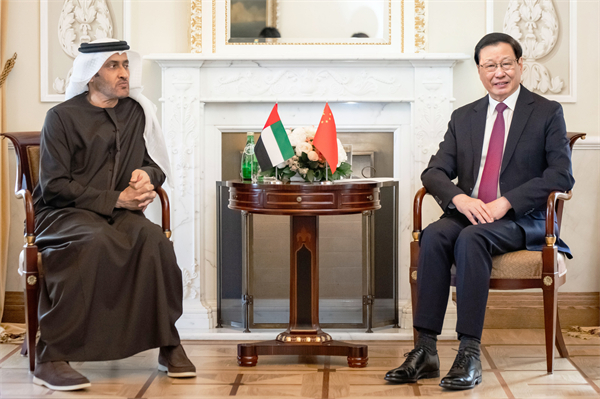
Ying Yong, Chief Grand Prosecutor and Prosecutor General of the Supreme People's Procuratorate (SPP) of China, meets with Attorney General of the United Arab Emirates Hamad Saif Al Shamsi.
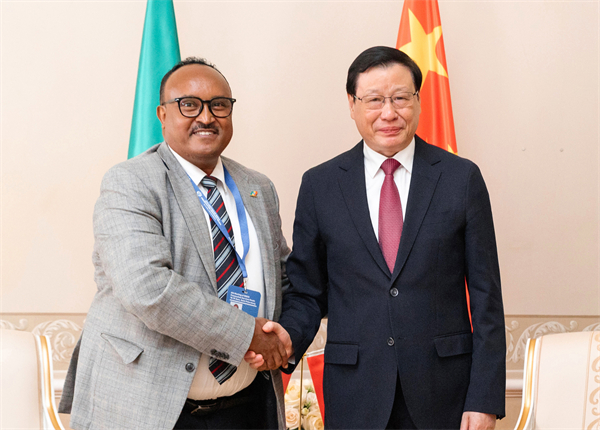
Ying Yong, Chief Grand Prosecutor and Prosecutor General of the Supreme People's Procuratorate (SPP) of China, meets with Ethiopian Attorney General Tesfaye Daba Wakjira.
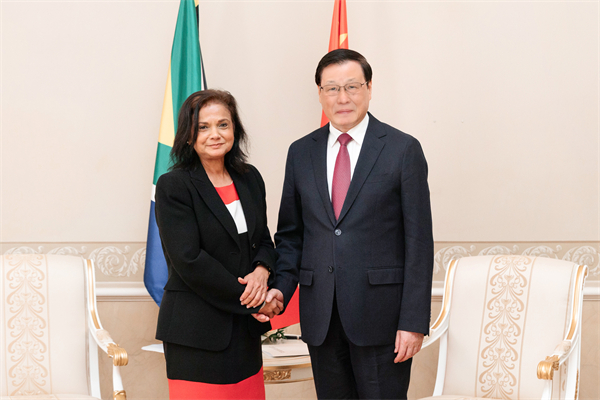
Ying Yong, Chief Grand Prosecutor and Prosecutor General of the Supreme People's Procuratorate (SPP) of China, meets with South Africa's National Director of Public Prosecutions Shamila Batohi.
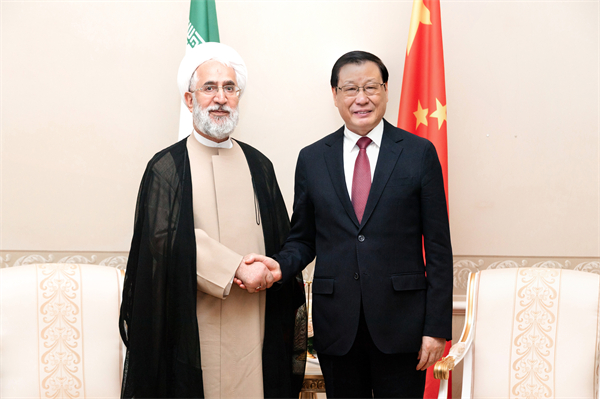
Ying Yong, Chief Grand Prosecutor and Prosecutor General of the Supreme People's Procuratorate (SPP) of China, meets with Iran's Prosecutor General Mohammad Movahedi Azad.
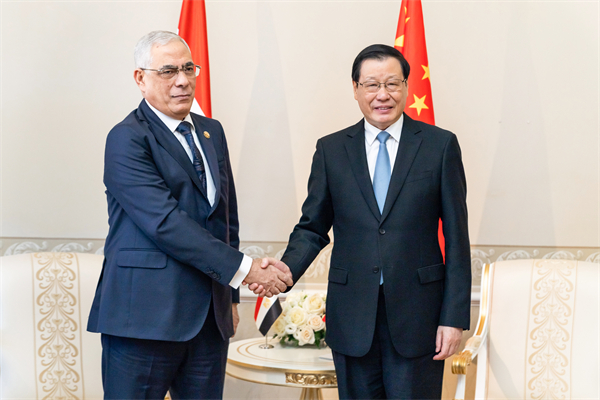
Ying Yong, Chief Grand Prosecutor and Prosecutor General of the Supreme People's Procuratorate (SPP) of China, meets with Egypt's Prosecutor General Mohamed Shawky Ayad.
On the sidelines of the meeting, Ying met with Attorney General of the United Arab Emirates Hamad Saif Al Shamsi, Ethiopian Attorney General Tesfaye Daba Wakjira, South Africa's National Director of Public Prosecutions Shamila Batohi, Iran's Prosecutor General Mohammad Movahedi Azad and Egypt's Prosecutor General Mohamed Shawky Ayad, respectively.
He briefed them on the efforts of China's procuratorial organs in ensuring that the people feel fairness and justice in every judicial case while adhering to the principle of "efficiently handling each case with high quality," actively advancing digital prosecution strategies, continuously promoting the practice of Xi Jinping Thought on the Rule of Law, and supporting and serving Chinese modernization.
The prosecutors general of the five countries fully appreciated China's contribution to deepening the development of the mechanism of the Meeting of the Heads of Prosecution Services of the BRICS Countries, and expressed sincere admiration for China's achievements in the development of the rule of law and its prosecutorial work.
They expressed their hope of learning from China's well-proven experiences, and strengthening practical cooperation in combating transnational crime, information technology application and prosecutors' training, in order to continuously improve the capabilities and levels of prosecutorial organs in their countries and better benefit the countries and their peoples.
